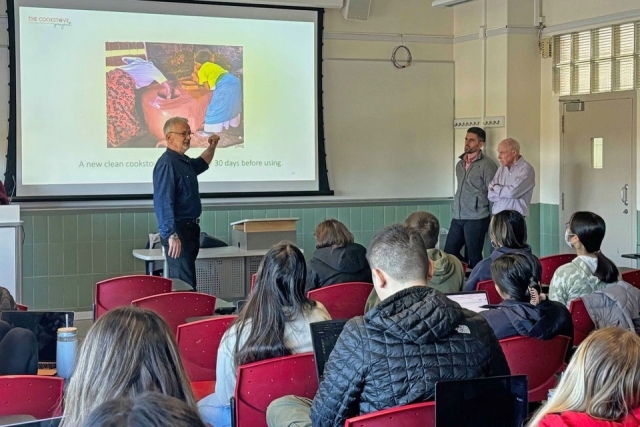
A group of St. John’s University students taught by Adjunct Professor Kevin McShane ’21MA raised more than $1,000 in the Spring 2025 semester for a nonprofit organization that promotes public safety and environmental sustainability in the developing world.
The Cookstove Project, established in 2013, aims to reduce preventable deaths in developing countries caused by cooking over open fires. The organization says nearly 2.6 billion people worldwide use open fires to prepare food, resulting in 3.8 million deaths from air pollution each year.
The St. John’s students, part of Professor McShane’s Ethics and Philosophy of the Human Person courses offered by the Department of Philosophy at St. John’s College of Liberal Arts and Sciences, were introduced to The Cookstove Project by board member Jeff Cadge, a friend and former colleague of Professor McShane.
“Students in Professor McShane’s classes should be congratulated,” Mr. Cadge said. “When they learned that a simple, inexpensive solution exists to an issue that leads to 3.8 million premature deaths, they were quickly motivated to help.”
Traditional stone cooking fires, often made with bricks and wood, are widespread in developing nations due to their availability and simplicity. They offer a basic cooking solution with minimal requirements and use materials that require few specialized skills to ignite.
However, the fires create toxic gases and other byproducts, including carbon monoxide, nitrogen dioxide, formaldehyde, benzene, methane, and methanol. These small-particle pollutants penetrate human lungs, causing permanent damage and, in many cases, death.
Children are particularly vulnerable. According to the World Health Organization, indoor air pollution is responsible for nearly half of the 1.2 million annual pneumonia fatalities among children four years old and younger.
“The fundraiser was an eye-opener for the students,” Professor McShane said. “They saw how a small contribution can make a significant difference in the lives of impoverished people. It really meant something to them and made the course come alive."
Thanks to the St. John’s students’ fund-raising efforts, a community in Uganda will soon receive 100 clean, efficient cookstoves that minimize exposure to harmful byproducts while reducing the number of trees cut down for firewood.
Since 2013, The Cookstove Project has delivered stoves to 51 villages in Uganda. It continues to install about 200 stoves each month. The group also delivers cookstoves to poor villages in Nepal.
“The Cookstove Project is more than just a health intervention, it is an empowerment tool,” said Courtney Skahill, a student in Professor McShane’s Philosophy of the Human Person class. “It gives people the knowledge and tools to make their homes safer and healthier. When working with limited resources, having that kind of self-sufficiency is powerful.”
The new cookstoves are made of clay, readily available in Uganda. Family members assemble them at home. A supervisor works with the family to ensure that all measurements are accurate, the wood burns properly, and fumes pass through the vent away from the household. The cookstoves require less fuel, meaning less wood is needed.
“I admire The Cookstove Project’s focus on community ownership,” said Dayeon Lee, a student in Professor McShane’s Ethics course. “Instead of simply sending in outside help and leaving, the project teaches families how to build and maintain their own clean cookstoves. When people take part in creating solutions for their community, they feel more responsible and involved. This makes the impact last longer because it is not something forced on them, but something they helped build.”
The Cookstove Project is one of several initiatives offered through the University’s Office of Community Engaged Learning, which was established in 1995. Such initiatives encourage students to apply their education in the service of global and local challenges.
Areas of student focus have traditionally included food insecurity, health care, homelessness, civic engagement, and youth services. Projects must serve a real need identified by the community agency; students commit to designated service hours and document their insights for class credit.
"St. John's has always recognized the value of student engagement on issues that align with our Vincentian mission,” said Director of Community Engaged Learning Frank A. Peluso ’13Ed, ’14GEd. “The community service and civic engagement our students perform reinforces their education through experiential learning in and around our communities. Community Engaged Learning benefits and supports our community-based organizations, our faculty, and our students."
Related News
Q&A with School of Education Alumna Linda I. Rosa-Lugo, Ed.D. ’77ED, ’79M.S.Ed.
Linda I. Rosa-Lugo, Ed.D. ’77ED, ’79M.S.Ed., recently accepted a new role as President of the American Speech-Language-Hearing Association (ASHA). Prior to this, Dr. Rosa-Lugo has been an active...
Insurance Leader of the Year Dinner Raises $3.6M for GSRM Students
A global gathering of aspiring students, insurance industry executives, and other supporters of the Greenberg School of Risk Management, Insurance and Actuarial Science (GSRM)—part of The Peter J...
TSOE Alumna Appointed Director of Curriculum in Amityville
Jessica Kemler ’99ED,’22Ed.D.—a double alumna of The School of Education at St. John’s University—began the new year as the new Director of Curriculum in the Amityville, NY, School District. “We are...
